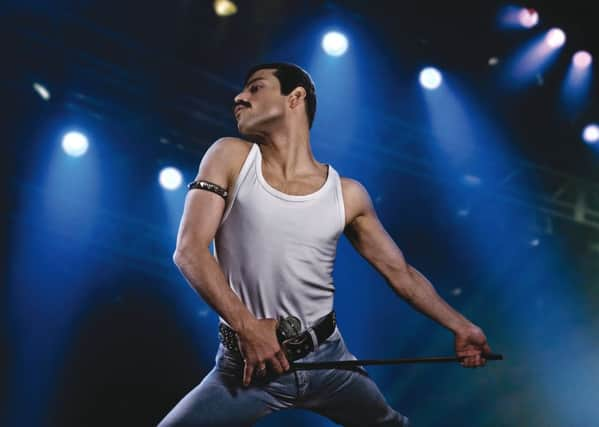Film reviews: Bohemian Rhapsody | Bad Reputation | The Hate U Give


Film reviews: Bohemian Rhapsody (12A) ***
Bad Reputation (15) ***
The Hate U Give (12A) ***
Simultaneously great and terrible, the new Freddie Mercury/Queen biopic Bohemian Rhapsody is the sort of film that on one level contradicts what the band – or at least, an early incarnation of the band – apparently stood for, and on another works completely by offering something for everyone who has ever found themselves stomping their feet to We Will Rock You, hand-clapping to Radio Ga Ga or head-banging, Wayne’s World-style, to Brian May’s guitar riff from the operatic prog rock classic that gives the film its title. Essentially a greatest hits compilation of hagiographic biopic clichés – one that has the whiff of officially branded merchandise about it – the film benefits from some uncanny performances that help it transcend all the dodgy wigs and telegraphed dialogue; and of course it has that majestic back catalogue to draw from whenever things start sagging.
Appropriately enough the film is bookended by Queen’s historic Live Aid performance at Wembley Stadium on 13 July, 1985 – a gig that has been mythologised in the popular imagination as the performance that saved the concert, uniting a flagging crowd and TV audience not won over by the likes of Status Quo, Adam Ant or The Style Council. The film’s smartest and boldest move is to recreate that set almost in its entirety to capture not only how glorious it was, but also how great Queen were as a live act.
Advertisement
Hide AdBefore we get to that point, however, there’s a lot of ground to cover. Directed by Bryan Singer, who retains his credit despite being fired towards the end of production (replacement Dexter Fletcher has a consolatory executive producer credit), the film rewinds to 1970 to track how a young, sexually confused design student by the name of Farrokh Bulsara (Rami Malek) transformed himself into Freddie Mercury and helped turn a promising student rock group by the name of Smile into a boundary pushing, disco-flirting, stadium-filling rock band named Queen.
It’s here that the film settles into the familiar rock biopic formula beloved by everything from The Doors to Walk the Line: no moment is too banal to mythologise, no famous riff too complicated to have arrive fully formed in a spontaneous moment of creation and no fact is too rigid to get in the way of a good story. There’s even a scene where an Evil Music Industry executive tells them that formula works and there’s no way in hell he’s going to release a six-minute song with references to Galileo and Bismillah. (Said executive is played by Mike Myers, whose presence allows screenwriter Anthony McCarten to throw in a meta reference to the aforementioned Bohemian Rhapsody rock-out scene from Wayne’s World.)
The film gets more interesting as it explores Freddie coming to terms with his sexuality. Mercury hid his queerness in plain sight, allowing fans to euphemistically embrace his flamboyant brilliance as a performer instead of acknowledging the fact he was gay. The film isn’t coy about exploring this, delving into his complicated relationship with Mary Austin (played by Lucy Boynton), whom he married and remained friends with after coming out, and showing his destructive relationship with personal manager Paul Prentis as he threw himself into the gay club scene of the late 1970s and early 1980s.
At the same time, the film tones down a lot of the debauchery, presenting Freddie as someone who ultimately craved the loving of embrace of family. It also fudges the timeline of his HIV diagnosis to amp up the backstage drama of that Live Aid performance rather than, say, acknowledging that one of the reasons Queen’s reputation was in need of reviving was due to being blacklisted by the United Nations for touring apartheid South Africa the previous year.
Nevertheless, Malek (best known as the star of Amazon’s TV show Mr Robot) finds layers to Mercury almost in spite of the film, and while Ben Hardy isn’t all that convincing as drummer Roger Taylor, supporting turns from Gwilym Lee as guitarist Brian May and Joseph Mazzello as bassist John Deacon (he even gets the Sideshow Bob hairstyle right) ensure the band looks and feels authentic on screen. There’s also no denying the rousing nature of the finale. Like Queen at Live Aid, this is a film that gives the people what they want.
Sticking with music, Bad Reputation offers a convincing argument for Joan Jett’s canonisation as a feminist rock and roll icon. Though, the film skips over some of the darker, exploitative aspects of her first band, The Runaways, it shines a light on her status as an absolute workhorse who lives for music and shows how she’s not only been forced to fight sexism her whole career, but also how she’s been instrumental in helping younger musicians do the same, whether it’s becoming an integral part of 1990s feminist punk movement Riot Grrrl or simply leading by example.
Advertisement
Hide AdAdapted from Angie Thomas’s best-selling young adult novel about a gifted teenager (Amandla Stenberg) whose double life as a poor black kid attending an elite white prep school is rocked when her childhood best friend is shot and killed by a cop during a routine traffic stop, The Hate U Give offers a worthy primer on racial issues in the age of Black Lives Matter.
It’s a teen movie, so it’s understandably a little earnest and emotive, but it’s also well-acted and slickly directed, which helps it avoid becoming a well-meaning after-school special. - Alistair Harkness